Previous BRICS summits
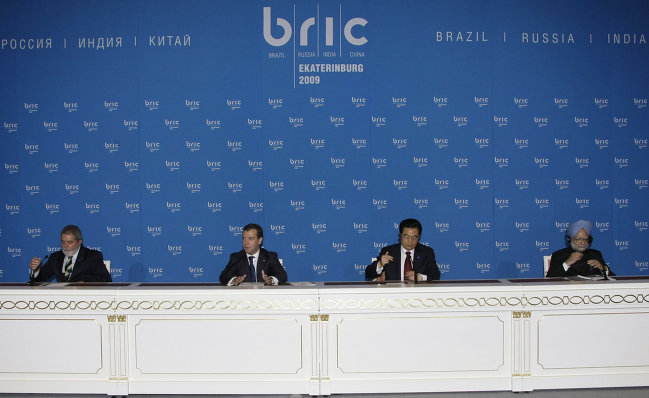
1st BRIC Summit (Yekaterinburg, Russia, 16 June 2009)
The 1st BRIC Summit was attended by Dmitry Medvedev (Russia), Jose Inacio Lula da Silva (Brazil), Manmohan Singh (India) and Hu Jintao (China). They met twice during the event: at the top level and with the participation of members of their delegations.
The participants paid special attention to issues of the global economic crisis, food security, development strategies and further consolidation of the BRIC countries and the need to reform the United Nations.
At the end of the Summit the BRIC Leaders signed two documents: a Joint Declaration (that stated in part that the second Summit would take place in Brazil) and a Joint Statement on Global Food Security.
Summing up the results of the Summit, Mr. Medvedev made a statement of behalf of the BRIC Leaders, urging more economic reforms and more transparency in appointing top managers of international financial institutions.
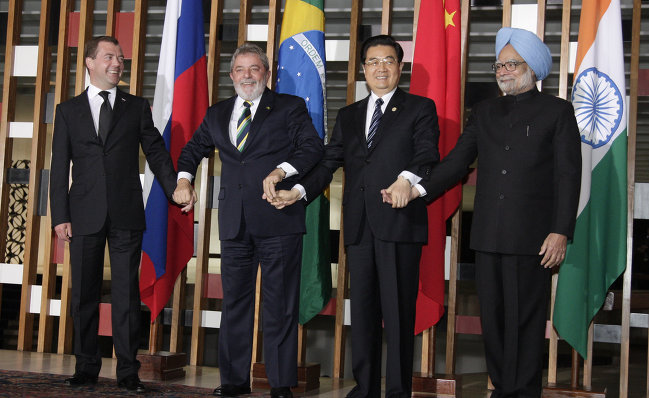
2nd BRIC Summit (Brasilia, Brazil, 15-16 April 2010)
The 2nd BRIC Summit was attended by Dmitry Medvedev (Russia), Jose Inacio Lula da Silva (Brazil), Manmohan Singh (India) and Hu Jintao (China).
The Leaders discussed urgent issues, such as Iran's nuclear programme, BRIC Development Strategies and the future, the current economic situation, the reform of financial institutions and cooperation in global governance.
At the Summit they signed a number of documents on overcoming the aftermath of the 2008 global economic crisis, and creating a new financial order, including their right to have more influence in such international agencies as the World Bank and the IMF.
The Republic of South Africa expressed its desire to join BRIC at the G20 Summit in Seoul (the Republic of Korea) on 12 November 2010. On 21 December, then Russian President Medvedev and Indian Prime Minister Singh adopted a Joint Statement endorsing South Africa's involvement in BRIC. On 24 December, South Africa's Minister of International Relations and Cooperation Maite Nkoana-Mashabane said she received a notice from Chinese Foreign Minister Yang Jiechi inviting South Africa to become a fully-fledged member of BRIC on behalf of its members (China was serving as BRIC Chair at that time). Later on Chinese President Hu Jintao invited South African President Jacob Zuma to take part in the next BRICS Summit in China in April 2011.
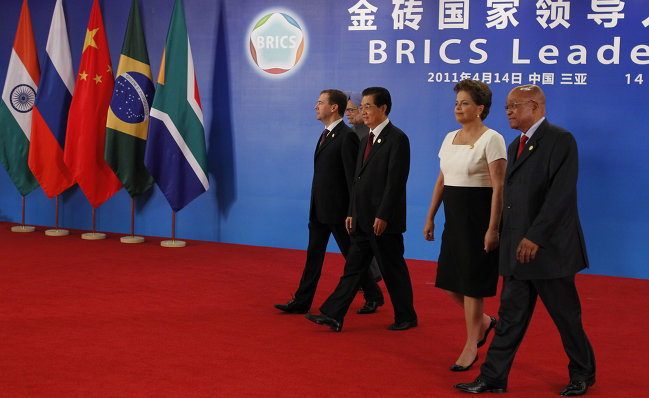
3rd BRICS Summit (Sanya, China, 13-14 April 2011)
The 3rd BRICS Summit was attended by Dmitry Medvedev (Russia), Dilma Rousseff (Brazil), Manmohan Singh (India) and Hu Jintao (China). At that Summit South Africa officially joined BRIC. It was represented by Jacob Zuma.
The participants discussed the reform of international financial institutions, promotion of cooperation within BRICS, development of dialogue on combating terrorism under the aegis of the UN, UN reform, economic cooperation based on national currencies, and the war in Libya.
At the Summit they signed a Joint Declaration formulating the main areas of global policy and their Action Plan for 2012.
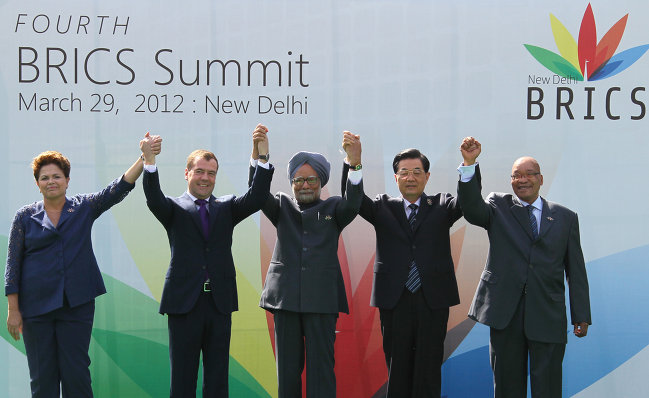
4th BRICS Summit (New Delhi, India, 28-29 March 2012)
The 4th BRICS Summit was attended by Dmitry Medvedev (Russia), Dilma Rousseff (Brazil), Manmohan Singh (India), Hu Jintao (China) and Jacob Zuma (South Africa).
The Leaders discussed global economic issues, anti-crisis measures and settlement issues related to Syria and Iran. They reviewed the possibility of establishing a BRICS New Development Bank and mechanisms for drawing their markets closer together. In this context they instructed their finance ministers to study the viability of this initiative.
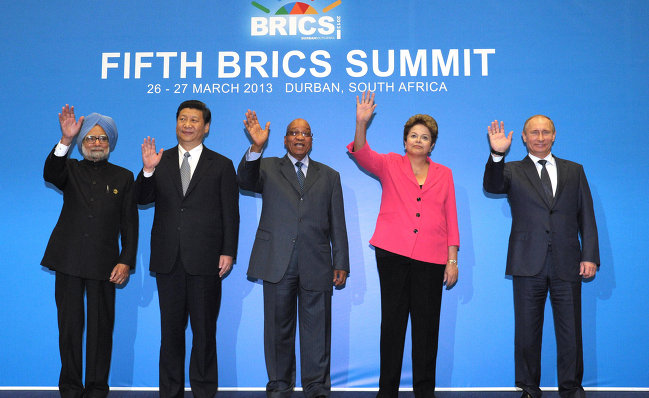
5th BRICS Summit (Durban, South Africa, 26-27 March 2013)
The 5th BRICS Summit was attended by Vladimir Putin (Russia), Dilma Rousseff (Brazil), Manmohan Singh (India), Xi Jinping (China) and Jacob Zuma (South Africa). They continued their discussion of the Development Bank, launched in 2012.
At that Summit the BRICS Leaders adopted the eThekwini Declaration and Action Plan. The Declaration gives an assessment of the current global political and economic situation and reflects common approaches of the BRICS countries on urgent issues of multilateral cooperation. The Action Plan reflected new areas of cooperation and specified BRICS activities in 2014. The participants signed agreements on cooperation in the green economy and co-funding of infrastructure projects in Africa. They also signed a declaration on establishing a BRICS Business Council and a declaration on setting up a consortium of expert centres of their countries.
At the Summit the BRICS Leaders met with heads of African states. President Putin pointed out at that meeting that the BRICS countries are jointly upholding the rights and interests of African and other countries with transitional economies, and believe that they should play a bigger role in the global system of governance, in particular within international financial and economic agencies.
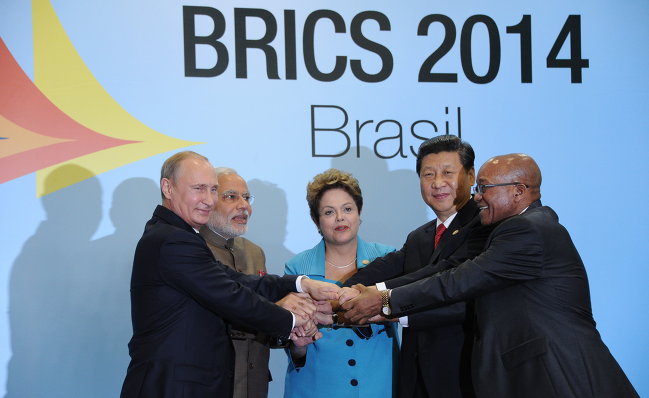
6th BRICS Summit (Fortaleza and Brasilia, Brazil, 15-16 July 2014)
The 6th BRICS Summit was attended by Vladimir Putin (Russia), Dilma Rousseff (Brazil), Narendra Modi (India), Xi Jinping (China) and Jacob Zuma (South Africa).
At the Summit the BRICS Leaders signed an agreement on establishing a New Development Bank and a treaty on creating a Contingent Reserve Arrangement.
They established a ceiling of $100 billion on the Bank's charter capital, and agreed to distribute half of the sum among their countries.
Under the signed documents, the Contingent Reserve Arrangement (the BRICS Reserve Fund) will operate like the IMF: when necessary, it will issue loans to those BRICS countries that have problems with their payment balances. The fund will amount to $100 billion. The contribution of each participant will be commensurate with its economy. The central banks of the BRICS countries will preserve their shares in the gold and currency reserves, while the issue of loans will be linked to a relevant IMF programme. Thus, every country that applies for aid needs to justify its request by stating that it is experiencing pressure on currency markets or that its national currency has abruptly dropped. The BRICS countries reserve for themselves the right not to participate in the Fund's formation.